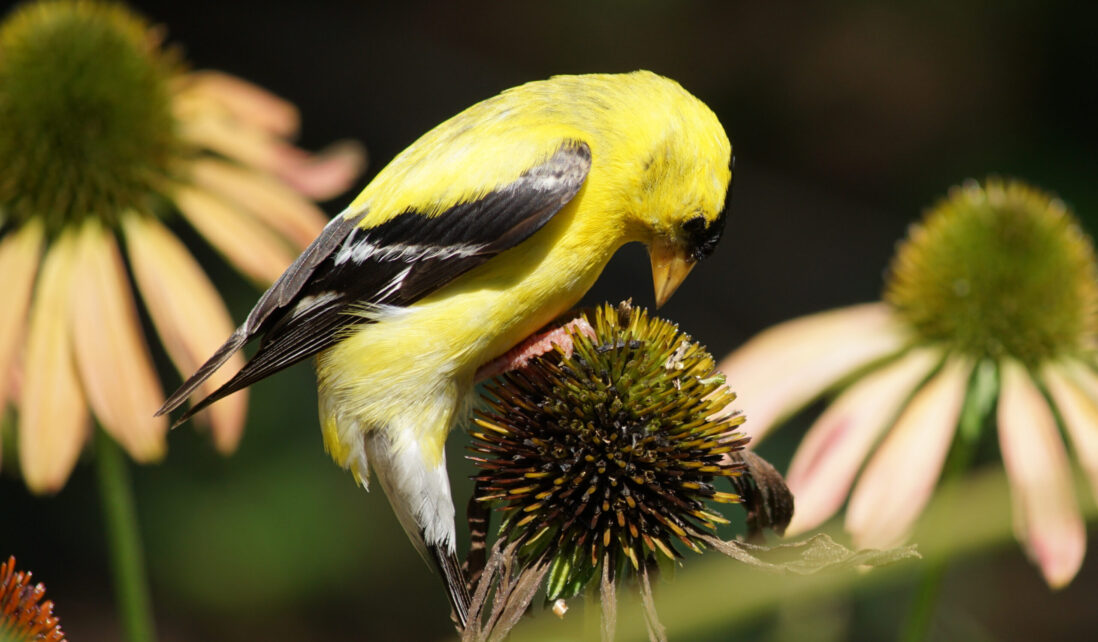
Zoey Young is a rising junior at Lake Forest College, double majoring in biology and environmental studies and minoring in English. She is working as an Illinois-Indiana Sea Grant summer intern with Sarah Zack and the pollution prevention team. Zoey’s summer role involves conducting a survey on lawn care practices among Indiana homeowners. The research data will help assess the Lawn to Lake program needs and guide the development of educational materials. Additionally, she is assisting in the progress of the Marine Debris Action Plan. To learn more about our summer internship opportunities, visit our Summer Internship Program page. Read below a story Zoey wrote for the Indiana Audubon Society, connecting natural lawn care practices to the health of local birds.
As we strive to maintain our lush green lawns, it’s important to be aware of the unintended consequences that improper lawn care practices can have on the environment. While we may not often consider it, the way we care for our lawns can directly impact the well-being of our feathered friends. Illinois-Indiana Sea Grant has published a survey to assess where knowledge gaps exist in hopes to create a comprehensive understanding of proper lawn care. To help our cause, you can take the survey at go.illinois.edu/INLawnSurvey—by completing the survey, you will be entered to win electric lawn equipment.
A polished lawn that lacks natural vegetation deprives birds of essential food sources. By removing weeds, insects, and native plants, we disrupt the balance of the ecosystem and can unknowingly create a food desert for birds. Many bird species rely on insects for their diet. The absence of insects due to pesticide use and the lack of native plants diminishes the availability of natural food sources, putting avian populations at risk. This can be addressed by planting native plants that are suitable to your lawn’s specific needs. We call this: right plant, right place. Not only will planting native vegetation help birds, but it will also benefit local pollinators, thus improving the overall health of the ecosystem!
Another issue that we face is that improper lawn care practices also contribute to habitat destruction. The excessive use of fertilizers, for instance, can lead to nutrient runoff, contaminating nearby water bodies. This pollution harms aquatic organisms, disrupting the entire food chain and negatively impacting birds that rely on these habitats for food and nesting sites. When high amounts of nutrients like nitrogen and phosphorus get into the waterways, this can cause something called eutrophication. Eutrophication causes large algal blooms which consume the water’s oxygen and kill aquatic life beneath the surface. Moreover, the removal of trees, shrubs, and bushes to maintain a pristine lawn deprives birds of nesting sites and shelter. One of the best ways to combat this problem is to be careful when applying fertilizers. Make sure you fully read the label and have a good understanding of when and how to correctly apply these nutrients to your lawn.
Finally, one of the most significant dangers to birds arises from the use of pesticides and herbicides. These chemicals can have devastating effects on avian populations. Birds can come into contact with these toxic substances when they eat insects or seeds treated with pesticides. There are case studies that can be referred back to, like in the instance of DDT. DDT was an insecticide widely used from 1874-1972 until it got banned by the EPA. The adverse effects of this chemical were causing drastic drops in bird populations as the chemical was interfering with their reproductive cycle. This is not an isolated event, and can be studied with the use of other big-name pesticides and insecticides. Proper use of these chemicals is strongly advised as it is one of the biggest rising threats to bird populations across the world. Luckily, there are ways to address pest problems in your yard without widespread pesticide use. We call this Integrated Pest Management (IPM). The first steps of IPM are to take preventative measures like building soil health and practicing optimal mowing techniques. If your weed and pest problems persist, it is best to hand-pick or spot-treat with natural products.
Birds are one part of an ecosystem that is constantly changing and adapting to the habitat surrounding it. As urbanization and human lifestyles become more integrated with the environment, it is important for us to be aware of how our practices affect the natural world. Illinois-Indiana Sea Grant is asking you to help us address this issue by taking our survey: go.illinois.edu/INLawnSurvey.
Share our posts on Facebook or Twitter below:
🌱Win FREE electric LAWN EQUIPMENT!🌱
Indiana residents — take our lawn care survey and enter for a chance to win 1 of 3 electric lawn care packages: https://t.co/kP2VrMV25C
The survey will help inform our programming for natural lawn care practices to protect the environment. pic.twitter.com/8AEjn2WLJi
— Illinois-Indiana Sea Grant (@ILINSeaGrant) July 20, 2023
Illinois-Indiana Sea Grant is a partnership between NOAA, University of Illinois Extension, and Purdue University Forestry and Natural Resources, bringing science together with communities for solutions that work. Sea Grant is a network of 34 science, education and outreach programs located in every coastal and Great Lakes state, Lake Champlain, Puerto Rico and Guam.
Writer: Zoey Young, IISG Pollution Prevention Intern
Contact: Sarah Zack

